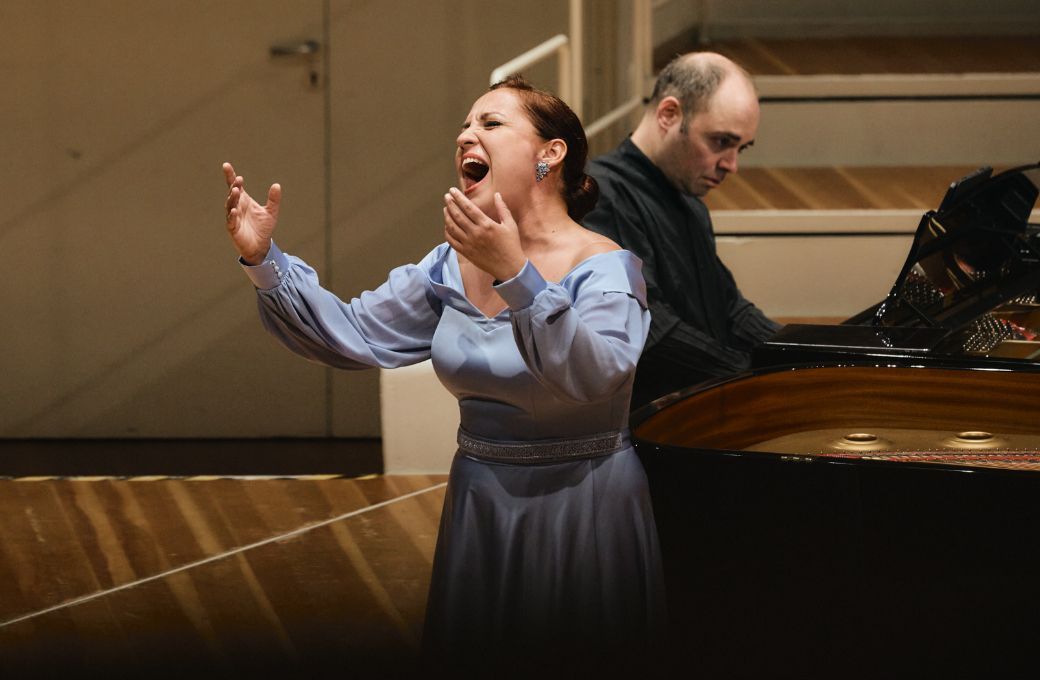Accustomed as we are to attending concerts in large venues and grand halls, we risk forgetting that much music is meant to reside and thrive in smaller, more intimate spaces. Indeed, a lot can happen in one room, with only a few musicians introducing the audience into a space that is musically, if not physically vast. No better proof of this was the first of the three concerts that pianist Alexander Melnikov is due to perform at this year’s Musikfest Berlin, centred on Rachmaninov and Beethoven.
On the opening evening, Melnikov was never alone on stage, partnering with a number of different artists to present to the public the many facets of Rachmaninov’s chamber repertoire. Cellist Alexander Rudin, soprano Nadezhda Pavlova and pianist Olga Pashchenko alternated at Melnikov’s side to paint a picture of the composer’s versatility in genres that are distinct from his more famous orchestral works, but still bear some of his signature traits.
The virtuosity required by most of Rachmaninov’s piano compositions has inspired some extreme fictionalisations of the difficulties they pose, his concertos especially being portrayed as haunting rites of passage that a musician has to confront at the cost of health. None of this was conveyed by Melnikov, who approached the Cello Sonata in G minor with a composure and control that were perfectly matched by Rudin. The two of them agreed on a clear-headed interpretation, where even within the outbursts of volume no energy went to waste. Throughout the piece, Melnikov mastered quick, but never abrupt tonal shifts, dissolving sforzandos into pianissimos in the span of a few bars, ranging from insistently rhythmic sections to more lyrical oases. This ability to meticulously calibrate the touch on his instrument was shared by Rudin, whose legato technique did great favour to Rachmaninov’s melodies.

Succeeding Rudin on stage, Nadezhda Pavlova joined Melnikov to perform the Six Romances, Op.38, whose unity is ensured by the character of the texts, all penned by Russian Symbolist authors of different generations. What the poems have in common is a strong, emotionally charged visual quality. Rachmaninov’s music captures this contemplative streak, providing a mostly slow-paced, evocative musical setting. While perhaps somewhat generic, Pavlova’s interpretation was uniform and stylistically coherent, her middle register firm and projected well enough to allow for a beautiful messa di voce. Melnikov followed like a trusted friend, sometimes duetting with the voice, sometimes keeping to the background – if such it can be called, given the number of short, demanding agility passages.
In the second half of the evening, Pashchenko momentarily replaced Melnikov at the piano and introduced herself with Rachmaninov’s virtuosic transcriptions of Wohin?, the opening Lied of Die schöne Müllerin, and The Cradle Song by Tchaikovsky. Such presentations would have set anyone on edge, but Pashchenko played comfortably and smoothly, preserving the singable quality of the originals while simultaneously being absorbed by the dense, whirlwind accompaniment.
Inevitably, the concert’s finale had the two pianists joining forces. For two such confident performers, a work like the composer’s own two-piano arrangement of his Symphonic Dances is a veritable field day. Facing each other on stage, Melnikov and Pashchenko did indeed resemble two dancers, taking turns or coming together to impress the audience. It is perhaps redundant to point out what amazing synchrony they had, considering that the score often features dizzyingly fast moments that require absolute rhythmic precision. Taking each other’s cues, they left the listeners no time to be nostalgic for the orchestral version, proving that sometimes it only takes two musicians to bring a symphonic work to life.


